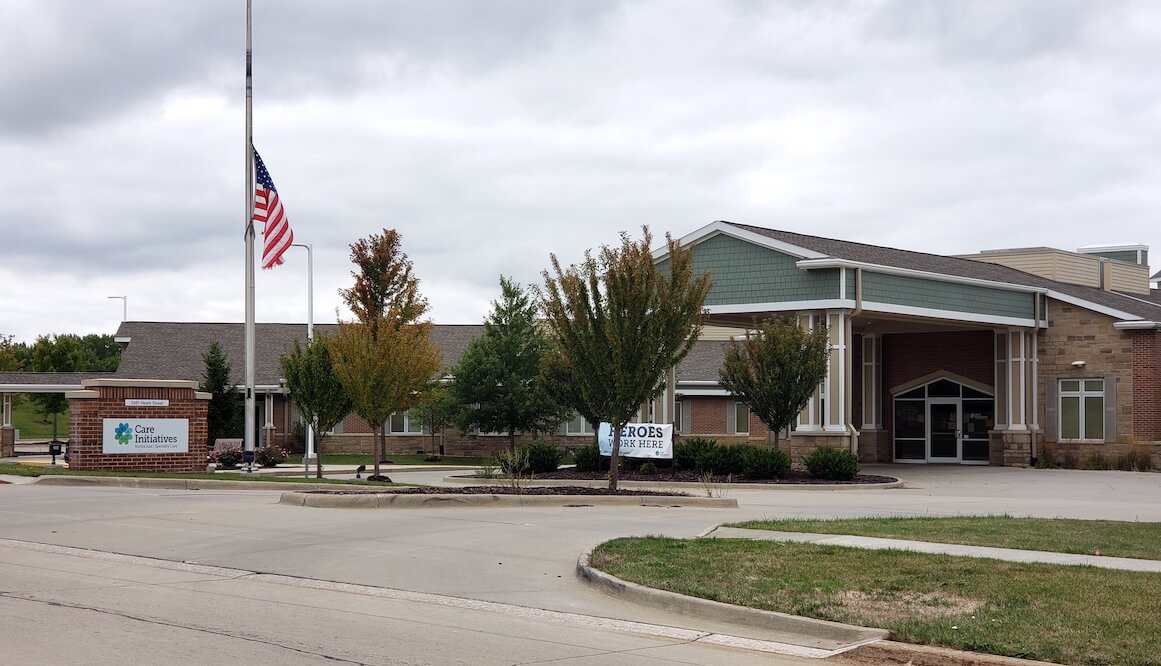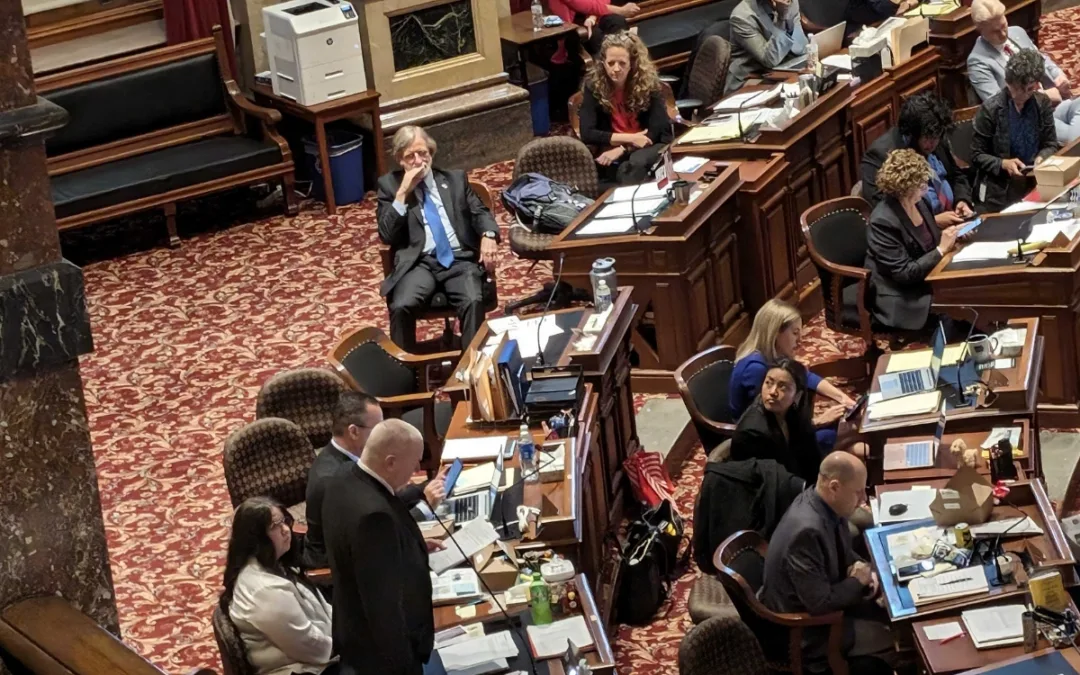
On August 25, 2020, the Courier reported a coronavirus outbreak at Pinnacle Specialty Care and NorthCrest Specialty Care, both owned by Care Initiatives. Even before the outbreak, family members of those at NorthCrest Specialty Care felt left in the dark, disconnected from their loved ones that they haven’t been able to visit for months.
In late August, Walter Martin, who had cancer and had to leave NorthCrest periodically for treatments, was put in a private room and quarantined as a safety precaution. Martin did not have COVID-19 and his cancer seemed under control. But by the first week in September his daughter, Roshanda Brooks, found out —by accident—he had tested positive for COVID-19.
“My phone wasn’t working and they said they’d kept trying to get in touch with me,” said Brooks, who is his primary emergency contact. After days of trying, they called her brother in Texas, who’s listed as a secondary emergency contact.
“They said that he [father] had tested positive for COVID and he was just laying there, he hadn’t eaten in four days. And I’m like, okay, you all might not have my number but you have my brother’s number and it took you all to the point where he was almost dying for you to call my brother to tell him that he was COVID positive and you all sent him to the hospital to basically die?”
[inline-ad id=”1″]
While Martin was at the hospital, Brooks learned he had bedsores that were infected and a urinary tract infection, in addition to COVID-19. Martin was treated for the UTI and bedsores, his sodium levels increased, and he’d started eating and drinking a little. When nothing more could be done for him at the hospital, a week later he was returned to NorthCrest and turned over to hospice.
Brooks, who had been prevented from seeing her father since the end of July, is upset by the level of care he received.
“Why is he not getting cleared up at the nursing home? I don’t understand this. I understand he can’t walk and all that stuff, which means they’re not turning him like they’re supposed to. He’s just in a room that they got him quarantined in, he’s just in the room.”
Days ago, her father died.
[inline-ad id=”3″]
According to family members interviewed, not knowing how their loved ones are really doing is a major concern and source of frustration. They are prevented from visiting them due to COVID-19 precautions. It is hard to get questions answered or callbacks. Many of their family members aren’t eating and yet they can’t take them food. They don’t know how often COVID-19 testing is being done and who is being tested. They don’t know what is being done to prevent the spread of COVID-19 or why those in quarantine continue to become infected. They don’t know if quarantining is being done correctly, if it is okay to keep COVID-19 residents in the same rooms permanently and have the same staff caring for positive and negative residents. They don’t know if contact tracing is being done. They don’t know if their loved one has COVID-19—or even details on their general health.
“I get his vitals twice a day—that’s the only link I have,” said Mary Johnson (who did not wish to use her real name), referring to her brother whom she has physically seen only once in six months. She gets his vitals because she calls NorthCrest until she gets them.
“If anything should happen to my brother, that’s all I got. And I can go back and say, well you told me on such and such a date, this whole week, you said his vitals were fine. That’s all I got and I don’t even know if that is accurate.”
[inline-ad id=”2″]
What other information she’s able to personally ascertain is via limited visits through a closed window or Zoom calls, which she has twice a week. But the information she gleans is only based on what she sees on the screen, since a nurse always remains in the room
Johnson also fears that many are not following PPE protocols.
“The nurse who set up the Zoom call,” said Johnson, “she came and did not have a mask—not even the white paper one or the PPE equipment —and then she must have realized, must have seen my face on Zoom because … then she put her mask and stuff on. I didn’t say anything, but I have to wonder, how many times does this happen throughout the day.”
Joyce Wilder, who hasn’t been able to see her mom since early August, saw something similar before visits were disallowed.
“Lady comes and opens the door for me. No mask. No gloves on. Nothing,” she recalled.
[inline-ad id=”4″]
Wilder added that a nurse, with no mask or gloves, gave her mom a can of pop and opened the straw for her.
After numerous calls and voicemails to get NorthCrest’s side of the story, I was directed to their corporate office, Care Initiatives. After several calls, Char Schlepp, SVP/Director of Operations, replied that she is looking into answers to these questions. We don’t yet have those answers, but will update if they are provided.
All of this has left family members feeling powerlessness—and caused some to seek action from entities beyond NorthCrest.
Johnson has taken her concerns to the Iowa Department of Health, Department of Inspections and Appeals (DIA), and a volunteer Ombudsmen. Wilder has called the Black Hawk County Health Department (BHCHD). Both stated that their calls have produced no results.
[inline-ad id=”5″]
Dr. Nafissa Egbuonye, Director of BHCHD, remembers talking to a family member about hygiene and testing.
“Any time we get a resident or family member complaint, we do follow-up with the center and we go through the whole protocol,” she said. In response to the NorthCrest inquiry, “I had staff—I had the disease surveillance manager and our epidemiologist follow up with that and they determined that they‘re [NorthCrest] following protocol.”
By following protocol, Dr. Egbuonye means checking that NorthCrest is testing as required, following safe hygiene practices, has adequate resources, and more. In fact, long before family member complaints, BHCHD has been doing daily check-ins with NorthCrest to assess compliance and will continue to do so until things stabilize. So far, they have not discovered problems, but this has been from calling the center.
“You have to remember,” adds Dr. Egbuonye, “that these are phone calls.”
[signup_form]
If the phone calls uncover a red flag, the DIA—the governing body responsible for long-term care facilities—would become involved.
Wilder stated no one called her with an update and she did not know of the daily calls. But after learning about them, she questions their effectiveness—how NorthCrest keeps passing and yet it feels like they are on the verge of another outbreak.
Which brings things full circle: family members are upset because they can’t see their loved ones or feel confident that they are receiving good care, and don’t know what is really going on.
“Why can’t you have a room where I go in there, bring my dad in there? He’s situated on one side of the room, I’m standing on this side of the room. I see him, I have my mask on,” wonders Pamela Alexander, a social worker who lives in Wisconsin.
Though she’s visited her father through the window several times in August and has a monthly FaceTime chat, his condition makes talking hard for him. All of which is not acceptable to Alexander.
“I want to see him,” she said. “I want to see how he’s doing. I want to see if he’s gaining weight. I want to see if he’s eating properly. I want to know what he’s thinking.”
[inline-ad id=”7″]
Johnson agrees.
“I cannot stand not being able to see my brother. Winter’s going to be coming. They have not been able to go out or anything. If you think you’re going to keep me out of there through Christmas, you all got another thing coming. Some kind of way, we’re going to put some pressure on them where they have to open it up or relax it a bit for family. They got to,” she said.
I received this answer from Care Initiatives yesterday.
“We are working on that plan on Thursday with our Quality/Operations group,” said Schlepp, “to see if we can with the new CMS guidance allow more visitation but follow the regulatory implications of CMS, DIA and IDPH.”
by Rachelle Chase
Posted 9/23/20
Iowa Starting Line is an independently owned progressive news outlet devoted to providing unique, insightful coverage on Iowa news and politics. We need reader support to continue operating — please donate here. Follow us on Twitter and Facebook for more coverage.
Politics

AEAs cutting workers in wake of Republican legislation
Iowa legislators said a new bill cutting money for agencies that help students with disabilities wouldn't affect services. But area education...

He said what? 10 things to know about RFK Jr.
The Kennedy family has long been considered “Democratic royalty.” But Robert F. Kennedy, Jr.—son of Robert F. Kennedy, who was assassinated while...
Local News

No more Kum & Go? New owner Maverik of Utah retiring famous brand
Will Kum & Go have come and gone by next year? One new report claims that's the plan by the store's new owners. The Iowa-based convenience store...

Here’s a recap of the biggest headlines Iowa celebs made In 2023
For these famous Iowans, 2023 was a year of controversy, career highlights, and full-circle moments. Here’s how 2023 went for the following Iowans:...




